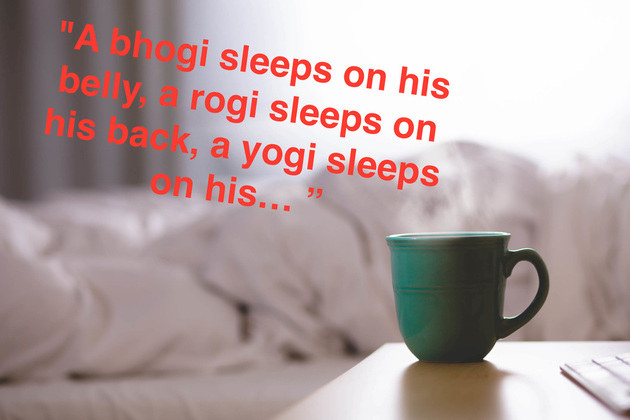In my early twenties I suffered from vāta type insomnia. Each night I lay in bed in a silent anxiety attack – heart beating, mind racing with worries. Stemming from childhood shock and loss, I felt stuck in the pattern of nighttime anxiety, until I combined daily yoga to open my spine, daily ujjayi prāṇāyāma in śavāsana & yoga nidrā.
In three months of consistent practice, the nighttime anxiety settled, and I was able to begin sleeping deeply, every single night.
Sleep is essential for mental, emotional and physiological health. A lack of sleep is one of the most primary causes of illness, while consistent nighttime deep sleep and dream sleep results in health, vitality, immunity and intelligence.
“what is the best sleeping position?
When I was in private practice as a yoga therapist, one of the biggest questions I received was “what’s the best sleep position”… so let’s take a look. Starting with a classic expression from vedic culture:
“A bhogi sleeps on the belly,
a rogi sleeps on the back,
a yogi sleeps on the side”.
Let’s investigate each part…
A bhogi sleeps on the belly…
Bhoga means enjoyment.
A bhogi is one whose life is centered around pleasure. Every action is dedicated to the procurement of pleasure {and the funds it takes to invest in pleasure}. This kind of person is described in the Bhagavad Gītā as ultimately suffering greatly.
Imagine a person coming home late from a night of boozing and eating and literally FALLING asleep face down on the bed. That’s a bhogi sleeping on the belly.
Now, if you happen to have a habit of sleeping on your belly {and many people do}, it doesn’t necessarily mean that you are staying out partying every night; just take that as an extreme visual example. The truth is, habits develop for a number of reasons: from repeated patterns and conditioning to genetics and past life karma.
But for a belly-sleeper, there may be a seed of a tendency to orient one’s life in a rajasic way, around self-interest, self-concern, and pleasure. There may be a distaste for discipline or doing things that are out of one’s comfort zone. There may be a seed of a tendency toward over-indulgence. Try to consider objectively… has your life any of these seeds?
Even if we can’t see the cause of a person’s belly sleeping, keep in mind that nothing is linear from the yoga perspective. Regardless of the cause, belly sleeping will also give the RESULT of excess bhoga – fixation on pleasure and distaste for discipline or discomfort. If you are sleeping on your belly, it could lead you toward more sensory excess in your waking hours and vice-versa. In my experience as well, belly-sleepers simply do not get good quality sleep, and studies have shown that depletion of sleep leads to sense pleasure-seeking during one’s waking hours {this is a specific hormonal impact of sleep depletion that accounts for weight gain and food cravings}
Belly sleeping can lead to neck and low back pain, contribute to differences between the two sides of your body, and increase pleasure-seeking during your waking hours.
A remedy is to add more discipline into your waking hours – such as an earlier wake-up time followed by a spiritual practice of some kind, regular bedtime, and regular meal times.

